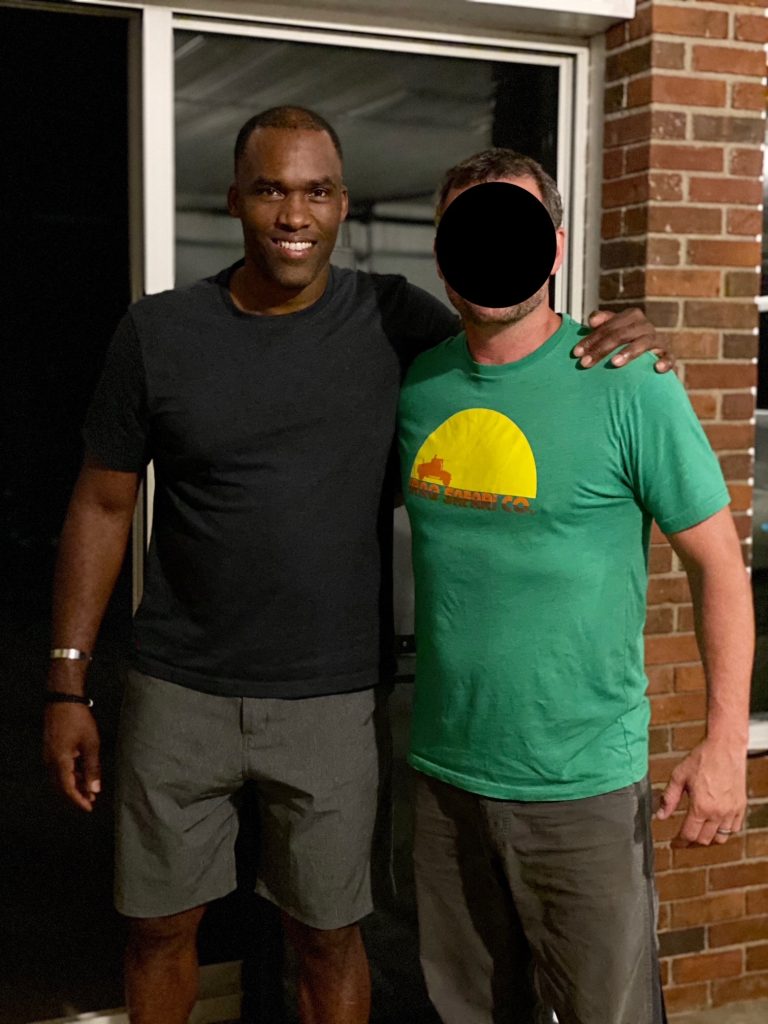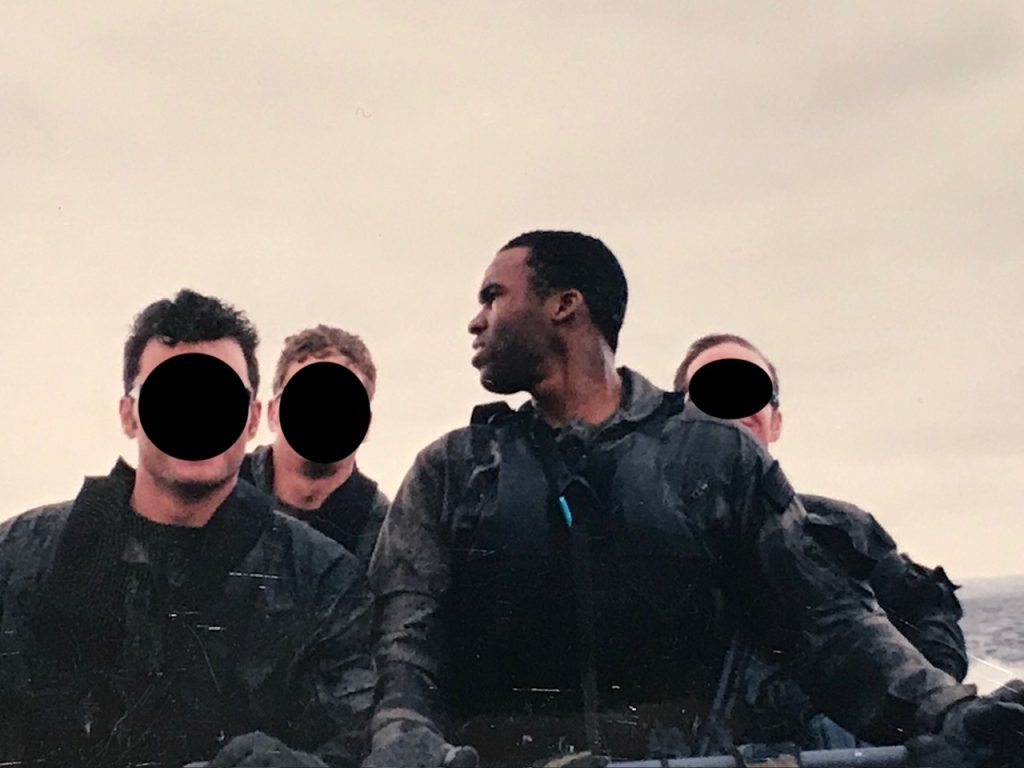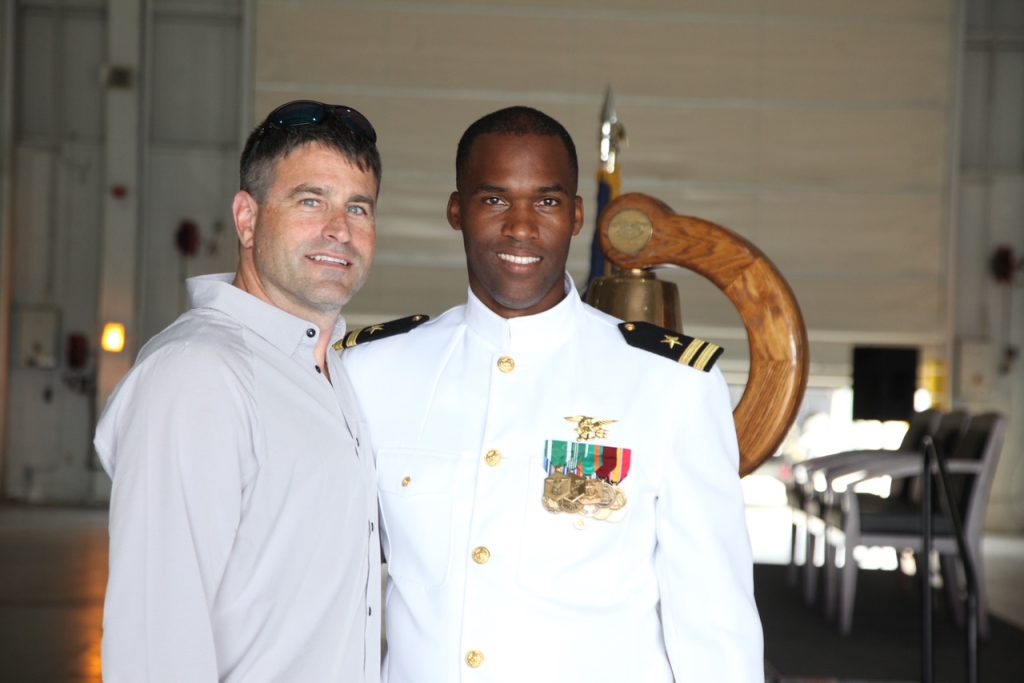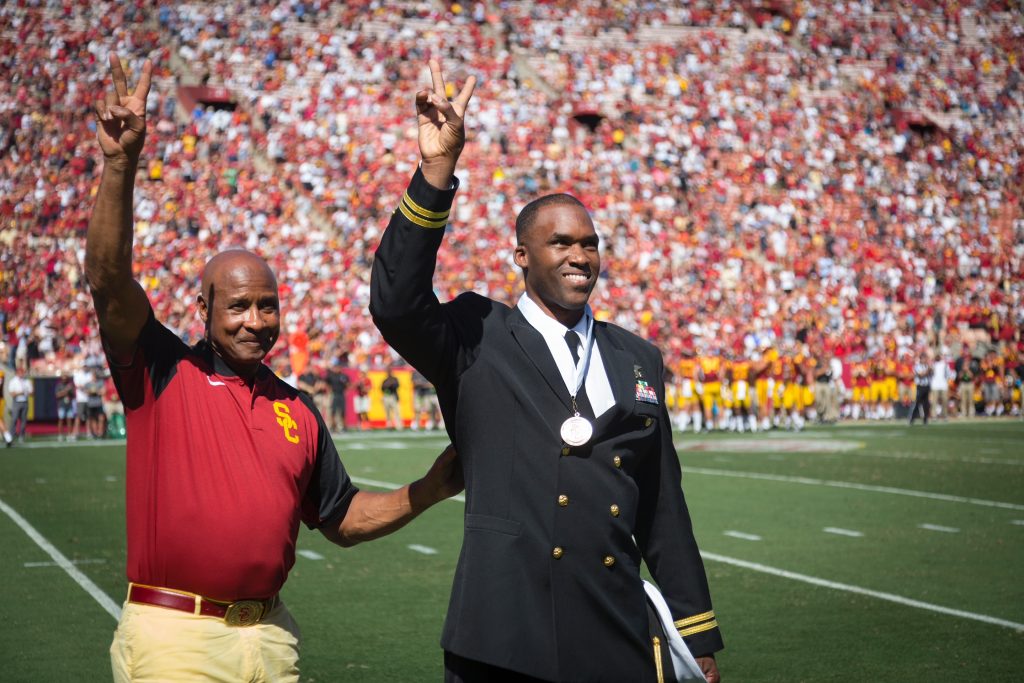Mark Greene: Discipline, Devotion, and the Relentless dedication to Excellence
By Jinge Li
When discussing Mark Greene, three words come to mind: devotion, dedication, and discipline.
The moment he began speaking as a guest in a USC entrepreneurship class, he completely transformed the room. What had been a noisy, distracted environment—students chatting among themselves or glued to their phones—suddenly shifted. Phones were put away and everyone became captivated by Greene’s words.
It’s rare to witness a scene like this in today’s world where everyone is so consumed by social media and their devices. But for Greene, this is just the norm—a reflection of his 19 years of service as a Navy SEAL.
“It was a series of failures that made me realize that being good for one iteration or one practice or one game was okay, but the hardest part was to be consistently good,” Greene said.
Now in his 50s, Greene is a retired veteran, father of four, and a proud Trojan who embodies high performance and unwavering commitment to helping others overcome obstacles in life.
“I’ve never achieved anything alone, the people who believed in me took a chance on me and gave me opportunities,” Greene said. “I wouldn’t be satisfied with life if I didn’t pay that forward… because it’s the right thing to do.”
Dedication
Greene first developed what dedication means when he was in elementary school.
“When I was 9, getting ready to go to my first football practice, my dad said, ‘Son, once you start something, there’s no quitting,’” Greene said.
“I said, ‘Okay, yeah,’ but didn’t take him seriously. Then he stopped me, knelt to my level, looked me in the eye, and said, ‘Once you start something, you can’t quit, because so many people are depending on you to see it through—whether you’re a star player or don’t play a second. Once you start, you have to finish.’”
That conversation left such an imprint on Greene that quitting was never an option. After suffering career-ending injuries in college Greene carried his “never quit” mentality into SEAL training and beyond, approaching each challenge as an opportunity to grow.
In SEAL training there is an exercise called “surf torture,” where trainees lay in the freezing Pacific Ocean as waves crash over them, and the cold seeps into their bones. “[The training] not about strength or speed—it’s about mental toughness,” said Matt Biss, a former SEAL who served alongside Greene.

“The instructors circled us, yelling, ‘Who wants to quit? Just three quitters, and it’s over,’ Biss said while recalling the trainning sessions.
Hours passed, and the cold became unbearable. Then, an instructor would come with a box of donuts for any who wants to quit.
“All you have to do is quit,” Biss continued. “You just get up [and] say ‘Hey, I’m done,’ and that’s it. You get donuts, a hot shower, and it’s all over. No more yelling.”

But Greene was different, Biss said, when they offered the donuts, Greene just looked up and said, “Well, are they jelly-filled donuts? Because if they’re not jelly-filled, fuck you. I’m not quitting.”
“You’re calling out the instructors in this miserable situation while we’re freezing our asses off,” Biss laughed, commenting on the memory. “That was a ballsy move.”
Glenn Fox, neuroscientist and assistant professor of clinical entrepreneurship at the University of Southern California said everything the SEAL went through It’s all an internal battle,
He said that to stay consistent and maintain motivation, it’s essential to battle with your brain’s dopamine cycle, which provides a rewarding boost, but the challenge is how to manage when that good feeling inevitably wears off.
“It takes a lot of consistency and a constant drive to keep challenging yourself to perform at a highly competitive level” – Mark Greene
Recalling his time in SEAL training during his 20s, Greene shared that one of the challenges he saw his peers go through was a lack of commitment.
“I’d go out and blow off steam, but I wouldn’t stay out late, and I’d only drink water. A lot of people who couldn’t stay focused did go out and blow off steam, but most of them never came back because they weren’t committed enough.”
The challenge is about connecting those behaviors to the long-term goals and benefits you set for yourself once you achieve them, Fox said. “It helps when we expect the emotions we’ll experience and understand where we’ll be emotionally.”
“Mike Tyson had a great quote,” Greene added. “Consistency and commitment is doing something you hate, but doing it like you love it.”
Reflecting on a recent high school reunion, Greene said, “A lot of those kids went on to high school, very few of us went on to college, and even fewer reached the top level in their sport… nobody was consistently good at what they set out to do as their dream.”
Devotion

Ryan DeVoe has been Greene’s best friend since college.
DeVoe was a track-and-field athlete from a small, predominantly white community, who had come to college on an athletic scholarship. His hometown wasn’t known for academic achievements, but coming from a small farm community he said the people there were very prideful.
Greene on the other hand, was breaking barriers as one of the few Black quarterbacks in the country.
“Back then, there weren’t very many black quarterbacks, it was mostly a white people who were quarterbacks,” DeVoe said. “So it was kind of interesting that he was going to college on the football team as a quarterback.”
Their first real bonding moment came one evening in the dorm when Spike Lee’s racially charged film “Do the Right Thing”, was shown.
“I think that they were trying to prepare people for when the 16,000 students came [back to campus], [They] were going to be white people. It wasn’t a diverse campus.” DeVoe said.
For a group of 18-year-olds still finding their footing in a new and complex social environment, the movie stirred up intense emotions.
DeVoe recalls returning to his dorm room feeling he was being targeted. “It felt like 15 or 20 people were calling me racist,” he said. “The movie gets people charged up—it’s not controversial, but it stirs emotions.”
The verbal aggression escalated, with some people singling DeVoe out, making him feel like the lone white person in the dorm was under attack. At that moment, he recalled, Green stepped in to de-escalate the situation.
Greene remembers the scene vividly as well.
“It was an emotionally charged movie, and all of Ryan’s friends turned on him, ” he said. “I was so angry. I thought, ‘No, this is wrong. I didn’t even like him much at the time — he was cocky — but what was happening was so egregious that it overrode any personal feelings I had. It was the moral thing to do.”
“He could have just gone along with the crowd. But instead, he stood up for me. That’s the kind of person he is.” – Ryan DeVoe
From that night on, DeVoe and Greene’s relationship evolved into something deeper. They weren’t just teammates or dormmates; they were brothers, bound by an unspoken understanding forged in adversity.
Years later, while Greene was serving overseas in the military, he often called DeVoe during critical moments.
There were times he’d tell me he didn’t know if he’d make it through, DeVoe recounted.
“His first thought before doing anything is always his family,” DeVoe added, his expression serious and his tone filled with emotion. “He’d call and ask, ‘Can you make sure you’ve got them?’ And I’d respond, ‘Of course, I’ve got them. I’m here with you all the way.’”
He would do the same things for me too, DeVoe said,
“If I called him this morning and told him I wasn’t in a good situation, he’d drop everything and get here as fast as humanly possible. Just to make sure I was okay and that whatever needed to be done was taken care of. That’s just the kind of deep, genuine person he is.”
For Greene, the motivation to stand by others comes from a deep-seated sense of responsibility.
“Someone is always relying on me,” he said. “My kids, my teammates, my family—I can’t let them down.” – Mark Greene
Looking ahead, Greene plans to find new ways to provide opportunities for others, extending his support beyond his immediate circle.
“I’ve never done anything by myself,” Greene said. “All the people who believed in me took a chance on me and gave me opportunities, so I wouldn’t be satisfied with life if I didn’t give back. If they need my help, then I’m going to help, because it’s the right thing to do.”
Discipline

In 2016, just weeks after retiring from the SEALs in August, Greene began working at USC.
At the time Greene was facing some of the most challenging moments of his life—navigating a divorce, transitioning from military service to civilian life, and battling the effects of Traumatic Brain Injury (TBI).
In the same Greene decided to take on another challenge to pursue a Master of Public Administration at USC.
“None of my SEAL friends surprised me when they threw out wild ideas like that,” Biss said.
Turning that aspiration into reality wasn’t simple. On top of everything Greene was already dealing with, pursuing a master’s degree meant he would now need to find more time for academics while managing everything else on his plate, all while undertaking a biweekly commute between Virginia and California with his family.
“To me, it’s a no-brainer. Mark’s going to do it—he’s going to make it work,” Biss said. “It’s just like solving a SEAL mission: you make it work. There’s no rule book for a lot of this stuff, and that’s what Navy SEALs do.”
For Greene, the goal is now clearer than ever: to graduate as a Trojan.
Every weekend Greene would show up at the same Starbucks at the same time, focused on finishing assignments, while carefully juggling work, studies, and friendships during the weekdays. “It took a lot of bandwidth, but I wanted it so badly that the sacrifices were worth it,” he said.
Greene said that having a structure and discipline were crucial in managing all of his craziness in life while managing the traumatic brain injuries he sustained from service.
“While the information is still there, accessing and processing it takes more effort,” Greene describe what is like living with TBI. “So, I’ve had to find ways not just to survive but to continue performing at a high level, even if I’m a bit slower cognitively than I used to be.”
Fox said that having structure and consistency helps free up mental bandwidth for other tasks and gives him a sense of control over his situation—something we can all adopt to help manage our chaotic daily schedules.
“That’s a really important part of rewiring our brain and rebuilding enthusiasm. It can be crucial for healing because it helps release those positive, feel-good chemicals,” Fox added.
Discipline has been a defining trait of Greene since his college days. In his 20s, while many of his peers spent their time partying and bar-hopping, Greene often prioritized his goals and personal growth.
“He didn’t pledge a fraternity, but he could walk into mine anytime he wanted. Everyone knew he was my brother, and he could have had anything he wanted. He just chose not to,” Biss said.
Their friendship was built on shared discipline and commitment to a healthy lifestyle.
“The next day, let’s say it was nine o’clock in the morning, Greene would say, ‘Let’s go work out.’ So we’d head to the complex. We had a lot in common because we were both pretty disciplined about working out and sticking to our eating regimens and none of that involved partying.”
To Greene, it’s all about aligning the short-term sacrifices towards achieving his long-term goals.
“If somebody picked out something for me, then I wouldn’t be as committed,” he said. “But once I pick something that I want to achieve… I’m going to do everything I can to achieve that goal.”
Despite his extraordinary background from his time in the SEALs, Greene said that graduating from USC was the proudest moment of his life.
“As you accomplish more and more, you sometimes lose the joy of achieving anything,” Greene said. “But being able to achieve all this and graduate as a Trojan is something I haven’t felt in a long time.”
